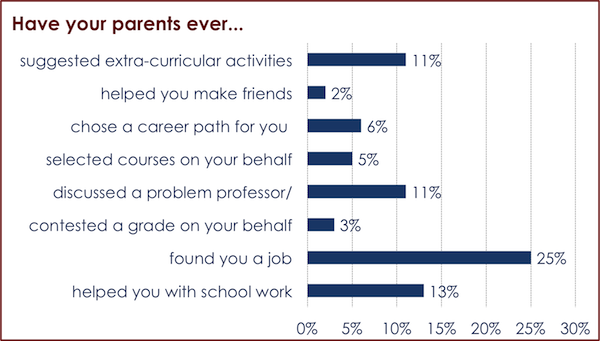We’ve all seen stories about “helicopter parents,” parents who hover over their children even after they enrol in university. But most of these stories are American in origin and tend to be anecdotal in nature. What’s the reality in Canada?
A few months ago, we asked our regular CanEd Student Research Panel what kind of on-going involvement their parents had in their lives. Did their parents help them with their homework or help them select courses or extracurricular activities? Had they helped them find a job, or (helicopter alert!) helped them contest a grade? The figure shows the results.
By some distance, the area in which parents gave the most assistance was finding a job, with runners up in assistance with school work, discussing a problem with a professor or administrator, and suggesting extra-curricular activities. Only 3% of students said their parents had behaved in that most helicopter-ish of ways by contesting a grade for them.
Female students were more likely to report having parental involvement in all of the categories compared to male students, and parental education was positively correlated with all categories as well. On academic matters, such as getting help with schoolwork and course selection, parental involvement increased with parental level of education. Anglophone parents were more likely to assist with schoolwork compared to other parents; allophone parents (many of whom are immigrants) were more likely to assist with course selection. Regarding choosing a career path or finding a job, allophone parents were more likely to be involved in choosing a career path, but substantially less likely to be involved with finding a job compared to Anglophone and Francophone parents.
Clearly, helicopter parents are not the norm among Canadian university students. So why do we hear so much about them? For one, they make a great news story. As well, it is possible that even a small percentage of meddling parents can affect institutional work patterns: at a campus of 30,000 students, if 3% of students’ parents call about their children’s grades, that’s 900 parental calls, or at least two calls a day, into the offices of Deans and Student Affairs. If that’s up from 2% a few years ago, that’s an extra 300 calls. That’s certainly enough to cause stories of helicopter parents to circulate, even if they aren’t in fact all that common.
— Miriam Kramer and Alex Usher


 Tweet this post
Tweet this post

First, these are the types of questions that lend themselves to social desirability bias so I would take the results with a grain of salt and assume underreporting. Secondly, as you mention in passing, even low percentages can be quite disrupting. As a TA, I was lucky enough never to get to answer a parent’s email or phone call, but I could not imagine discussing a grade with a parent, even once. It is completely outrageous behavior that has no place whatsoever in a university. Also, assuming a student is 18 years old or more I would actually refuse to discuss with the parent.